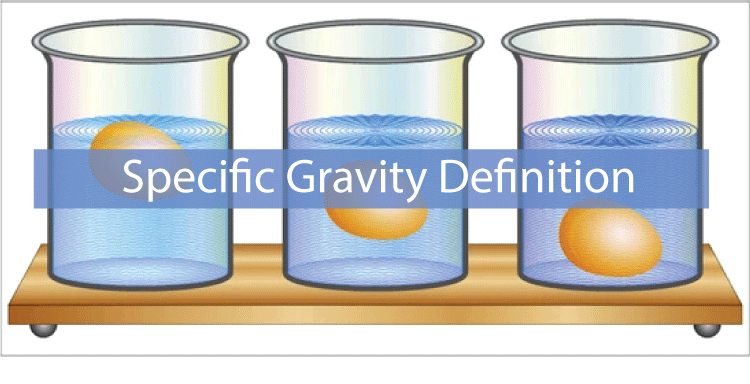Specific Gravity Definition
Relative density is another name for specific gravity. Specific gravity is a measurement of the density of a substance in comparison with water's density. It has no dimensions. The "SG" stands for "specific gravity."
Specific gravity =  = = 

The specific gravity values for various common materials are listed in the table below.
| Material |
Specific Gravity |
| 1. Alcohol |
0.82 |
| 2. Wood Oak |
0.77 |
| 3. Rubber |
0.96 |
| 4. Carbon dioxide |
0.00126 |
| 5. Petrol |
0.72 |
| 6. Dry Air |
0.0013 |
| 7. Cast Iron |
7.20 |
| 8. Nylon |
1.12 |
Gas Specific Gravity
The ratio of a gas's density to the air at 1 atm pressure and 60 degrees Fahrenheit temperature is known as gas-specific gravity. Gas-specific gravity can be easily determined at the wellhead and is used to determine the gas's chemical composition. The specific gravity of natural gas varies from approximately 0.55 to 0.87.
The specific gravity values for various gases are listed in the table below:
| Gas |
Specific Gravity (SG) |
| 1. Arsine |
2.69 |
| 2. Blast Furnace gas |
1.02 |
| 3. Butadiene |
1.869 |
| 4. Cyclopentane |
2.422 |
| 5. Decane |
4.915 |
| 6. Fluorine |
1.31 |
| 7. Heptanes |
3.459 |
| 8. Isopentane |
2.48 |
| 9. Hexane |
2.973 |
| 10. Neon |
0.696 |
| 11. Octane |
3.944 |
| 12. Ozone |
1.660 |
| 13. Pentane |
2.487 |
| 14. Sasol |
0.42 |
| 15. Silane |
1.11 |
| 16. Xenon |
4.53 |
Key Point on Specific Gravity
- Specific gravity is commonly described as the ratio of the substance's density to water's density.
- It has no dimensions at all. Because of this, it can be expressed as basic units raised to power 0. It implies that specific gravity has no measures.
- Water's specific gravity is measured in units, i.e., SG of water is 1.
- A substance will sink in water if its SG is greater than 1.
- The nearby environment's temperature and pressure impact specific gravity values.
- Mostly specific gravity is determined at temperature.
Application of Specific Gravity
- The primary use of specific gravity is determining whether an object will sink.
- Geologists and mineralogists use specific gravity to analyze the mineral composition of rocks, which is one of its essential applications. Geologists also use it frequently to differentiate between gems.
- It is also employed in the healthcare industry, where urinary specific gravity is utilized to determine the concentration of different solutes in urine. The urine test is a typical part of a urinalysis to look into specific diseases.
- It is utilized to check the electrolyte in the battery.
Elements Affecting Specific Gravity
A few elements that directly or indirectly impact specific gravity are listed below:
- Weight and mass of the material.
- Since specific gravity is determined under control, the temperature also impacts it.
- The specific gravity is affected by pressure conditions also.
FAQs on Specific Gravity
1. Difference Between Density and Specific Gravity.
Answer:
| Density |
Specific Gravity |
| 1. The mass of a material per unit volume is referred to as its density. |
1. The ratio of the density of a substance to water at any particular temperature is known as specific gravity. |
| 2. It is an unchanging quantity. |
2. It is a relative quantity. |
3. It measures in  |
3. It doesn't have a unit. |
| 4. [[M1 L-3 T0]] is its dimensional formula. |
4. It doesn't have any dimensions. |
| 5. P is used to indicate it. |
5. SG is used to indicate it. |
| 6. It is utilized in numerous household and industrial applications. |
6. It is utilized in companies to determine the concentration of solutions. |
2. Which metal has the greatest specific gravity?
Answer:
The lead has the greatest specific gravity.
3. Which substance has the lowest specific gravity?
Answer:
Lithium
4. What device is utilized to determine the specific gravity of liquids?
Answer:
The specific gravity of a liquid is determined using a hydrometer.
5. What does a urine-specific gravity test indicate?
Answer:
A urine-specific gravity test measures the density of urine to that of water density. The test reveals a person's level of hydration. The test also provides details regarding how effectively the kidneys concentrate urine.
6. What is the primary use of specific gravity?
Answer:
Geologists and mineralogists analyze the mineral components of rocks using specific gravity.
| 
 For Videos Join Our Youtube Channel: Join Now
For Videos Join Our Youtube Channel: Join Now





 =
= 






